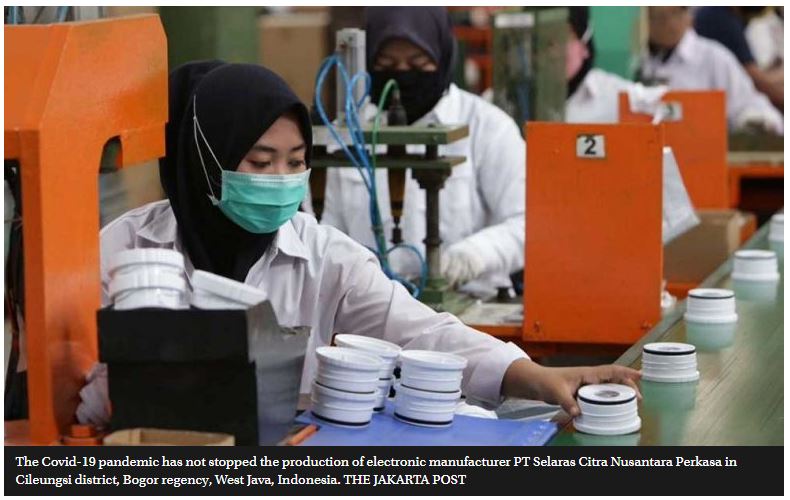Mushrooming import prices cost Indonesian manufacturing dearly
The Ukraine military offensive and the economic sanctions against Russia are putting Indonesian manufacturers in a tight spot, as increasing import costs eat into profit margins. Economists are saying it will only be a matter of time before firms pass on costs to customers.
Prices of conflict-impacted commodities like cereals, oil, gas, steel and coal have soared over the last two months since Putin ordered a “special military operation” against Ukraine in late February, worsening already high prices induced by increasing global demand amid the Covid-19 recovery.
Singapore-based think-tank Oxford Economics said industries in Indonesia, like in many other countries, have suffered from higher input costs as geopolitical tensions led to more supply shortages and trade disruptions.
“Industrial manufacturers will likely suffer with their margins being squeezed from higher input costs,” Sung Eun Jung, senior economist at Oxford Economics, told the Jakarta Post on April 25.
Most manufacturing industries have suffered, leaving only mining and raw-material producers to shine during these challenging times.
However, being a net-commodity exporter may not suffice to insulate Indonesia’s economy, Eun Jung warned, adding that the benefits of high commodity prices would only partially offset its negative impact.
Palm-oil producers in particular were expected to reap the benefits of increasing commodity prices, but recent palm-oil-export regulations may have decreased the full potential.
London-based data firm IHS Markit concurred by saying that many firms have reported intensified price pressures due to rapidly increasing input costs like raw materials and fuel, which they were shouldering together with clients. Firms also have to deal with longer supplier delivery times, due to shortages and transportation delays.
“Supply issues persisted with longer lead times reported even as Covid-19 disruptions appeared to have eased in April. Price pressures also worsened over April that could put a strain on production moving forward,” Jingyi Pan, economics associate director IHS Markit, said in a statement on May 4.
Last month, Indonesian factory activity expanded with the manufacturing Purchasing Managers’ Index (PMI) at 51.9, up from 51.3 the previous month, the fastest expansion since January, following an increase in demand amid the economic recovery. However, inflationary concerns have lowered business confidence.
Researchers from state-owned Bank Mandiri recommended businesses to focus on the impact of the prolonged conflict, which they estimated could last more than six months, but noted that it was hard to predict when the turmoil would end.
A prolonged conflict would result in higher container costs, disrupted raw-material supplies, higher energy prices and potentially lower demand from the global market amid recession threats in advanced countries.
“Manufacturing industries will be in jeopardy of rising input costs,” Mandiri’s research team wrote in their April report.
Bank Mandiri researchers expect producers may soon pass the burden of increasing input costs to consumers. This would add to the already possibly high inflation hike caused by at least three other factors: recovered economy activities, higher administered prices and a value-added-tax (VAT) hike.
All those factors would bring the inflation rate this year to 4.6 per cent, above the Bank Indonesia’s target of between two and four percent, prompting the central bank to raise the benchmark interest rate by at least 75 basis points in the second half, according to the researchers.
Oxford Economics’s Eun Jung said it was plausible for firms to soon pass on prices to customers, leading to sustained high inflation, although some companies may choose to reduce their margins instead, amid squeezed household-spending powers.
Should high global energy and food prices filter through to domestic prices, the think tank also estimates that Indonesia’s inflation may surpass Bank Indonesia’s inflation target range in the second half this year, but would soon decrease to within the central bank’s target again next year after monetary tightening is implemented.
Industry ministry spokesman Febri Hendri on May 6 said the increase in commodity prices would pressure industries and trigger price adjustments in the coming months. He gave his assurance that the government would come prepared to manage the hikes.
“In the short term, we would discuss with [business] associations about finding opportunities to source raw materials outside countries under conflict, but indeed this process would take time. Meanwhile, we have a long-term target to increasingly diversify sources of raw materials,” Febri said.
President Joko “Jokowi” Widodo on April 28 instructed all of his aides to prepare proper measures to sustain economic recovery. He also urged the business community to increase domestic production capacity and reduce reliance on imported products.
Finance ministry Fiscal Policy Agency head Febrio Nathan Kacaribu on May 4 said the government remained optimistic that Indonesian manufacturing would be able to continue expanding despite the current situation, but also admitted that the pressure from increasing prices could risk the sustainability of expansion.
“To maintain the current expansion trajectory amid increasing prices, the government is responding with price and non-price interventions including in the form of social protection for the poor and vulnerable,” Febrio said in a statement.
The government will also commit to several policies via the national economic recovery (PEN) programme to help both producers and consumers, in hopes of maintaining economic recovery.
THE JAKARTA POST/ASIA NEWS NETWORK


 Thailand
Thailand




